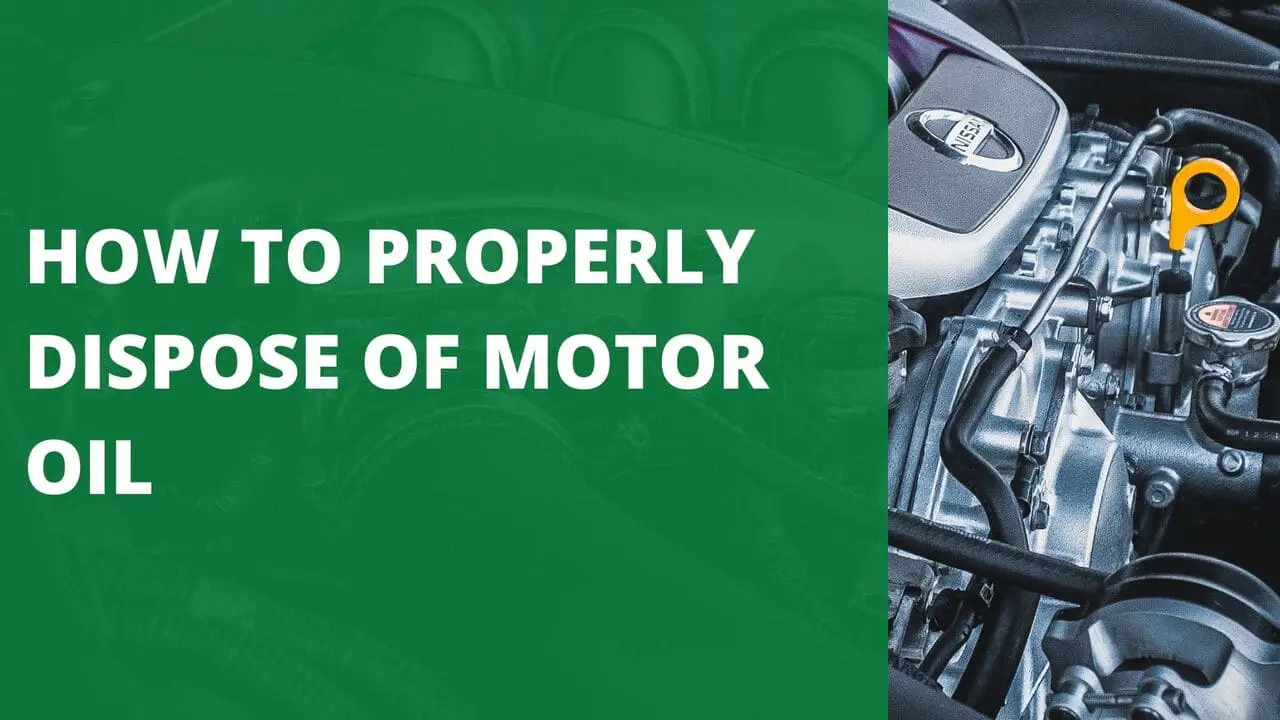As an Amazon Associate I earn from qualifying purchases.
Motor oil, the essential liquid that keeps our engines running smoothly, comes with an environmental responsibility.
For us, responsible car owners, it’s crucial to know how to properly get rid of used motor oil.
This isn’t just about keeping our cars in good shape; it’s also about protecting the planet from the harmful effects of improper disposal.
In this guide, we’ll dive into the details of how to dispose of motor oil, exploring the potentially harmful substances in motor oil, the importance of handling it correctly, the potential for reusing collected oil, and the role of companies that collect motor oil in promoting a sustainable future.
Before we get into the detailed steps of getting rid of motor oil, let’s take a look at the harmful substances hiding in this vital lubricant.
Hazardous Materials Found In Motor Oil

In the realm of our cherished vehicles, motor oil stands as a vital elixir, imbued with hazardous materials that beckon our attention and respect.
Among these elements lie heavy metals, polyaromatic hydrocarbons (PAHs), and other toxic chemicals.
The improper disposal of this essential fluid not only jeopardizes our environment but also disturbs the delicate equilibrium of ecosystems.
The first step toward responsible disposal begins with recognizing the potential harm associated with these elements within motor oil.
Visualize motor oil as the lifeblood coursing through the intricate veins of our machines, carrying heavy metals, PAHs, and a blend of other toxic chemicals.
While these elements are essential for optimal vehicle performance, their careful handling and disposal demand a sense of reverence.
The consequences of improper disposal transcend mere inconvenience.
They pose a threat to the delicate equilibrium of our environment, creating a subtle disturbance that resonates through the interconnected web of ecosystems.
The potential harm posed by these hazardous materials is not a concern confined to the present; it casts a looming shadow on the future sustainability of our planet.
To take the first step toward responsible disposal is to acknowledge the presence of these potentially harmful elements within motor oil.
It’s an act of understanding and recognizing the responsibility we bear as stewards of the environment.
By doing so, we integrate ourselves into the narrative of sustainable living, where every action, regardless of size, contributes to the preservation of our delicate planet.
Now that we understand the possible dangers of motor oil, let’s dig into why it’s crucial to handle its disposal or recycling with care.
Why Should You Dispose or Recycle Motor Oil?
The question of why we should meticulously dispose of or recycle motor oil resounds through the corridors of environmental responsibility, prompting us to delve into the profound reasons behind this conscientious act.
At its core, the answer lies in our duty to safeguard the planet from the serious consequences of negligence.
Recognizing that improper disposal can trigger a chain reaction of ecological harm is fundamental.
1. Direct Threat of Improper Disposal: Inappropriately discarding motor oil poses a direct threat to the sanctity of our surroundings.
Careless pouring into drains or onto the ground infiltrates and contaminates soil and water sources.
2. Disruption of Ecosystem Balance: This contamination disrupts the delicate balance of ecosystems, potentially harming aquatic life.
The ramifications extend beyond what’s visible, as improper disposal can release toxic fumes, compromising air quality and human health.
3. Evidence in Cause and Effect: Within this intricate web of cause and effect, the importance of responsible disposal becomes evident.
The far-reaching consequences underscore the need for a meticulous approach to motor oil management.
4. Motor Oil as an Environmental Hazard: Recognizing motor oil as more than just a commodity but as a potential environmental hazard is vital.
It emphasizes our role as custodians of the Earth, responsible for its well-being.
5. Recycling as a Sustainable Beacon: Recycling motor oil stands as a beacon of sustainable alternatives.
It transcends the conventional disposal route, redirecting hazardous materials from overburdened landfills and conserving precious resources.
6. Reprocessing for a Circular Economy: Through a meticulous process, recycled oil can be reprocessed into base oil, a key ingredient in crafting new lubricants.
This not only lessens the environmental toll of oil production but also reduces the demand for crude oil extraction, fostering a circular economy.
7. Recycling as a Testament to Stewardship: The act of recycling becomes a testament to our commitment to environmental stewardship.
It’s a deliberate choice to break free from a linear, wasteful approach and embrace a cyclical, sustainable one.
By choosing recycling over conventional disposal, we actively contribute to the reduction of our ecological footprint.
It’s a collective effort to champion the cause of a healthier planet for current and future generations.
Dispose of Motor Oil: A Step-by-Step Guide

1. Drain with Care
Starting the process of responsibly disposing of motor oil is like setting out on a thoughtful journey.
Instead of viewing it as a complex choreography, think of it as taking deliberate steps.
Begin this mindful routine by carefully draining the used motor oil from your vehicle’s engine. Use a dedicated oil pan to catch every bit, making sure it flows smoothly without any spills.
This first step is vital, as it lays the foundation for a responsible disposal process.
Take your time, handling the used motor oil with care, treating it as a valuable substance that deserves a gentle touch.
2. Store Safely
Now, smoothly move on to the next stage by putting the gathered oil into a sturdy container with a tight-fitting lid.
This container becomes the protector of the used motor oil, keeping it intact until it reaches its ultimate stop.
Make sure to clearly mark the container as “used motor oil” so everyone knows what’s inside.
This step guarantees that the collected oil stays safe and sound, all set for the next parts of the disposal process.
3. Locate a Collection Center
Now that you’ve securely stored the used motor oil, the next step is like a stroll in our disposal journey—find a suitable collection centre.
Explore your local area to discover a recycling centre or a service station that welcomes used motor oil.
Many communities have designated drop-off spots dedicated to responsibly handling this valuable fluid.
This step means actively joining your community’s efforts to manage used motor oil in a responsible and environmentally friendly way.
4. Transport Thoughtfully
As we move into the transportation part, think about it as a careful manoeuvre.
Make sure to firmly secure the container holding the collected motor oil to avoid any leaks or spills during the journey.
Whether it’s in the trunk or the bed of a truck, keep it separate from other items to preserve the oil’s purity.
Handling it with care ensures that the oil arrives at the collection centre untouched and ready for the next steps in the recycling process.
5. Never Mix Fluids
As we continue with our disposal journey, avoid the urge to add anything extra to the mix. Don’t mix motor oil with any other fluids, as it might make the upcoming recycling process more complicated.
Keep the oil pure, allowing it to go through the recycling process smoothly without unnecessary complications.
Think of this step as a pivotal moment in our journey, making sure that the collected oil stays in its pristine form for effective recycling.
6. Recycling Ritual
We’ve arrived at the thrilling end of our disposal journey at the recycling centre.
Hand over the carefully collected motor oil, signifying the completion of a responsible disposal adventure.
Envision the recycling centre as a magical space where the oil undergoes a transformation through processing and purification.
This recycling ritual is the outcome of a series of careful steps, contributing to the sustainable management of motor oil and leaving a positive impact on environmental stewardship.
Moving on from getting rid of used motor oil, let’s look at the possibilities for reusing it.
Sustainable actions extend beyond just getting rid of things; they involve discovering creative ways to give old motor oil a new purpose.
How Can We Reuse Successfully Collected Oil?
Recycling motor oil is a transformative journey that begins with a comprehensive refining process, delicately removing impurities and contaminants to create a high-quality base oil.
Enriched with carefully selected additives, this base oil becomes the foundation for crafting new and improved lubricants, reducing the environmental impact and significantly lessening the demand for crude oil extraction.
The multi-stage refining process ensures the removal of impurities, transforming used oil into a premium base oil, and setting the stage for its next life as a crucial component in various lubricants.
This holistic approach not only prevents environmental harm but also contributes to a sustainable and versatile cycle of reuse, highlighting the positive impact of responsibly managing used motor oil.
Used motor oil has a variety of uses, such as:
1. Revitalizing Vehicles
Recycled motor oil steps into a new role as it breathes life into automotive lubricants.
Picture it contributing to the creation of engine oils, transmission fluids, and various other lubricants for vehicles.
This isn’t just about resource conservation; it’s a significant stride towards sustainability in the automotive industry.
2. Powering Industries
The adaptability of recycled motor oil doesn’t stop there.
It seamlessly transitions into industrial applications, becoming a vital element in the production of lubricants for machinery, manufacturing processes, and power plants.
This isn’t just about efficiency; it’s about ensuring industrial operations are both effective and sustainable.
3. Paving the Way
Recycled motor oil takes centre stage in improving our roads. Acting as a binder in asphalt production, it becomes a key player in creating robust roads.
Not only does this contribute to durable infrastructure, but it also reduces our reliance on petroleum-based asphalt. This application showcases the dual benefits of environmental conservation and enhanced infrastructure.
4. Fueling Change
The versatility of recycled motor oil extends even further, making strides in the energy sector. It undergoes a transformation into fuel oil suitable for industrial boilers and furnaces.
This isn’t just an alternative fuel source; it’s a step towards reducing our dependence on traditional petroleum-based options. It’s about creating a more sustainable and diverse energy landscape.
Wrapping up our discussion on motor oil disposal and reuse, let’s highlight the crucial role played by companies that collect used motor oil.
These organizations serve as the connection between thoughtful consumers and sustainable waste management practices.
Motor Oil Collection Companies
If you’re looking for an easy and stress-free way to get rid of your motor oil, there are specialized collection companies ready to help.
These companies make the whole process smooth, taking care of your used motor oil with expertise and minimizing any impact on the environment.
1. Safety- Kleen stands out as one of the prominent re-refiners of used oil in North America, delivering diverse collection and recycling services for businesses and individuals.
Their expansive network of collection centres, coupled with a fleet of trucks, facilitates conveniently used oil pick-up from various locations.
2. Universal Environmental Services takes a leading role in environmental waste management, offering comprehensive used oil collection and recycling services.
With a widespread network of collection facilities across the United States and Canada, they provide versatile solutions, including on-site collection, bulk processing, and re-refining.
3. Veolia Environmental Services, a global leader in environmental solutions, extends its expertise to used oil collection and recycling.
With a worldwide network of collection facilities and re-refineries, they offer services like on-site collection, bulk processing, and re-refining.
4. In the Northeast United States, the New England Fuel Institute, a non-profit trade association representing the heating oil industry, provides various programs and services to aid responsible used oil management, including collection and recycling programs.
5. Catering to the Midwestern United States, Oil Recovery Services is a reliable provider of used oil collection and recycling services for businesses and individuals.
Their network of collection facilities and diverse services includes on-site collection, bulk processing, and re-refining.
Conclusion
Every car owner eventually faces the question of what to do with used motor oil.
Whether you’re getting an oil change or dealing with a leaky engine, it’s crucial to follow our advice to avoid accidentally contaminating a million gallons of drinking water with hazardous waste.
Taking a moment to dispose of your used motor oil correctly is a small effort that goes a long way in contributing to environmental conservation – and it’s worth it.
FAQ’s:
Can I pour motor oil down the drain?
Oh no, please don’t do that! Pouring motor oil down the drain can be harmful to the environment and cause serious damage.
Motor oil contains contaminants that can pollute water sources.
Instead, take it to a recycling center or an auto parts store that accepts used oil. They’ll know just what to do with it.
Where is the best place to dispose of engine oil?
The best place to dispose of engine oil is at a designated recycling centre or an auto parts store.
Many places have special programs for used oil recycling. They’ll make sure to handle it properly, preventing harm to the environment.
Is car oil flammable?
Yes, indeed! Car oil is flammable, so it’s essential to handle it with care. Keep it away from open flames or sparks.
When storing or transporting used oil, use a sealed container made for that purpose. Safety first!
Does motor oil expire?
Surprisingly, yes! Motor oil does have a shelf life, and it can degrade over time. Always check the expiration date on the container.
If there isn’t one, a good rule of thumb is to use it within three to five years of purchase. Using fresh oil ensures your engine gets the best protection.
Amazon and the Amazon logo are trademarks of Amazon.com, Inc, or its affiliates.

